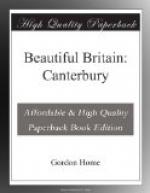Adjoining the Prior’s Gate to the east is the building now used as the Deanery. It was built by Prior Goldstone in late Perpendicular times as a guest-house for the reception of strangers, but has been much altered since that time. At the north-west corner of the court is a very fine Norman gateway, now surrounded by the modern buildings of the King’s School, and a little to the right is a Norman staircase, which by the goodness of Providence was allowed to remain when other destruction was in progress. This beautiful and unique example of a staircase of this early period is the most remarkable feature of the monastic remains. Beyond the Green Court Gate stood the almonry and a granary, and south of these buildings was the Archbishop’s Palace, so ruined in Puritan times that the remains of a gateway in Palace Street is practically all that can now be seen. The present palace is quite modern. Coming back to the Cathedral, the remarkably picturesque little circular Lavatory Tower standing on late Norman open arches is noticeable in its shadowy seclusion among the lofty walls of the choir chapels. This is generally known as the Baptistery, but the name only began to be used when the font Bishop Warner presented to the Cathedral was placed there. In the little garden in front of the Lavatory Tower are two Roman columns brought from Reculver more than a century ago when the church there became a ruin. West of this tower is the library, standing on part of the site of the great dormitory, and opening on to the cloisters is the chapter house, commenced in 1304 by Prior Estria and finished in 1378 by Prior Chillenden. The windows at the east and west ends are the largest in the Cathedral.
The great cloister, like the chapter house, largely owes its present appearance to Prior Chillenden, and is of exceedingly beautiful Perpendicular work with a splendid roof of lierne vaulting. Part of the south walk, with the doorway into the north transept—the successor to the Norman one through which Becket passed to his death—is shown in Mr. Biscombe Gardner’s drawing facing page 43. If one enters the Cathedral from this point, especially if it should be in the twilight of a gloomy day, the atmosphere of the murder seems to be all about one, notwithstanding the rebuilding at a later period of the actual scene, but the historic entrance is by the south porch facing the great gate of the priory, and as it is still the usual place of entry this short account of the interior will begin at that point.




